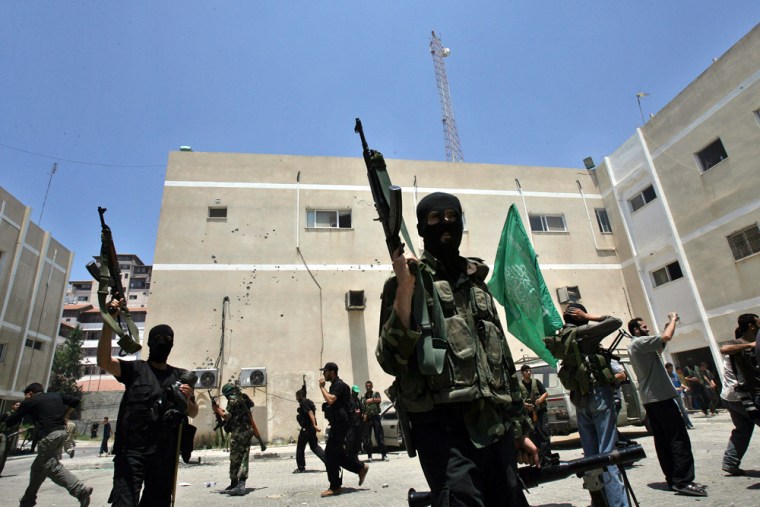TEL AVIV, Israel — For Israelis and Palestinians, as well as Lebanese and Syrians for that matter, 2007 was a period of adjustment to one incontrovertible fact: In Israel's war with Hezbollah last year, it lost the fear factor that it had always had in its back pocket. Israel suddenly seemed weak, confused and vulnerable, and its enemies were less afraid of the once mighty Israeli war machine. So the question for the year became, would its enemies try to take advantage?
In 2007, Syria was emboldened to talk tough, but not to act. Hezbollah also quickly rearmed and talked tough, but didn't act. And the Palestinians were too busy fighting each other to act much against Israel.
In all of 2007 there was only one suicide bomb attack against Israelis (an attack on a bakery in Eilat, Israel on Jan. 29 killed three) a welcome relief for Israel. So despite the threats, 2007 turned out to be one of the safest years in Israel since before the second Palestinian uprising began more than seven years ago.
Last year I pointed out several issues to watch for in 2007, and they did indeed turn out to be on the money.
Let's go through the issues I said to watch in 2007:
Palestinian infighting
Will Hamas and Fatah find a way to govern together, or will the daily violence and killings turn into all out civil war? In 2006, almost as many Palestinians were killed by other Palestinians as by Israel.
:
The answer: civil war. Furious, deadly, with hundreds of victims, and fought over several weeks, finally Hamas won complete control of the Gaza strip. And as a result, the Palestinian President Mahmoud Abbas declared that his government in the West Bank would stop all dealings with Hamas until Hamas went back on its coup d'etat in Gaza.
Hamas response was that they won the 2006 Palestinian election fair and square and that the fault was with Abbas for not honoring their victory.
***
Further conflict with Hezbollah?
Will Lebanon’s civil strife spill over, leading to more Israel-Hezbollah fighting?
:
Answer: No. Lebanon spent much of the year feuding over who would lead it, and what role Hezbollah would play in the leadership of the country. But it didn't turn violent, and Lebanon's border with Israel, apart from a few probes by both sides, stayed quiet.
What about Syria?
Will Syria enter the fray? Syria has been calling for peace talks with Israel, which Israel dismisses as a transparent ploy to gain international support. Washington does not want Israel to talk to Syria, but there are rising voices in Israel to open peace talks with Syria, even if the final price would be to return the Golan Heights
:
The questions I raised remain the critical ones and have not been resolved. Peace talks with Israel are still being mentioned, but are not happening. Syria did appear to be making military preparations for war, which it denied, but a sudden and secret Israeli air raid on a reputed Syrian nuclear facility turned the tables. Israel showed that it may look like a toothless tiger, but its claws are sharp and its reach is long.
***
Iran threat will likely grow
Iran will only grow as a threat to the region, along with calls to destroy its nuclear potential, if sanctions and negotiations do not succeed. And it’s not only Israel that’s concerned. Sunni nations such as Egypt, Saudi Arabia and Jordan (and eve Iraq) are worried too. They see the Iranian nuclear program as heading towards a Shiite bomb, aimed against them as much as against Israel.
:
Again, this played out as I warned, but again, with no resolution. Arab and European nations added their voices to calls for increased sanctions on Iran, already championed by America and Israel. But a sudden stunner turned the tables late in the year. A report from American intelligence said that Iran in fact had stopped developing its nuclear weapons program back in 2003. This took the wind out of the sails of those calling for war against Iran to stop its nuclear weapons program. No program, no war. Good for some, not for others. Israel was hugely disappointed and is challenging the findings.***
Gaza strife continues
And at home, everyone is predicting another round of fighting against Hamas in Gaza.
:
Here I was wrong. Israel did not attack Gaza, although it held months-long training for the assault, which all sources warn is eventually inevitable. But it hasn't happened yet, even though Palestinian militants continue to launch rockets against Israeli towns and villages almost daily.
***
Martin Fletcher is NBC News' Tel Aviv bureau chief and lead correspondent. Click here to see his predictions for 2008.
